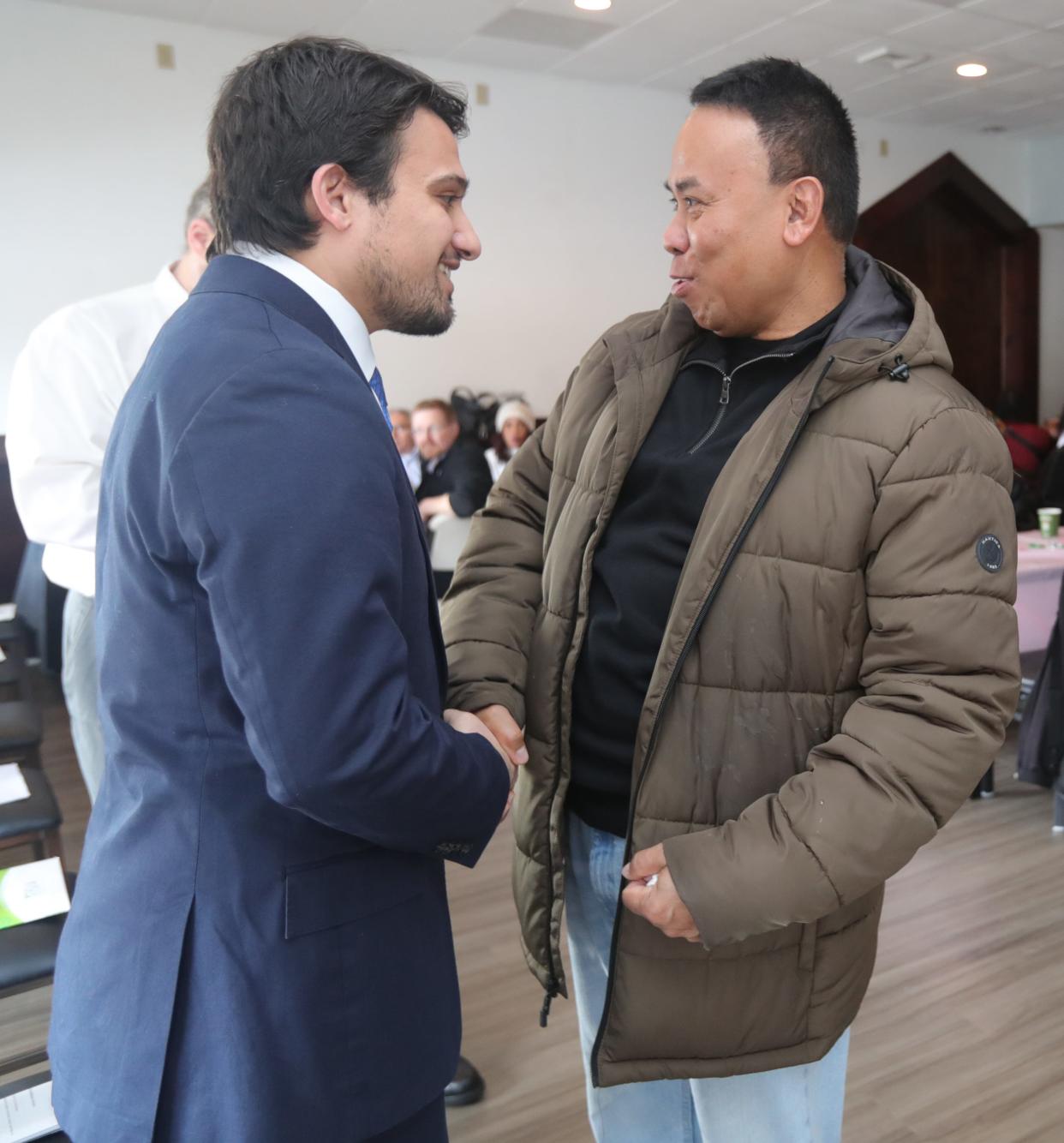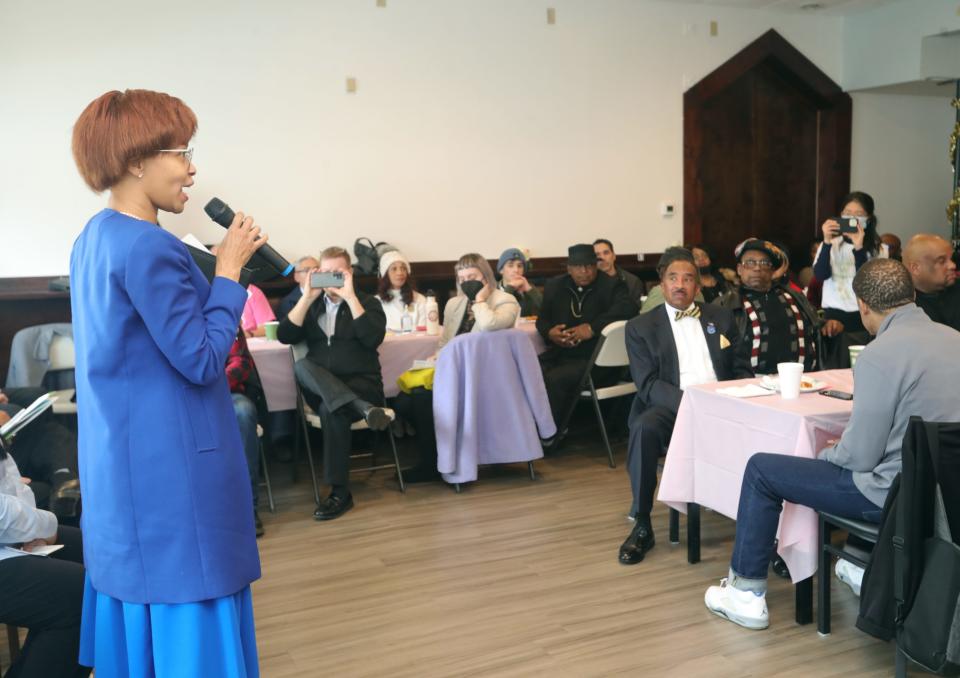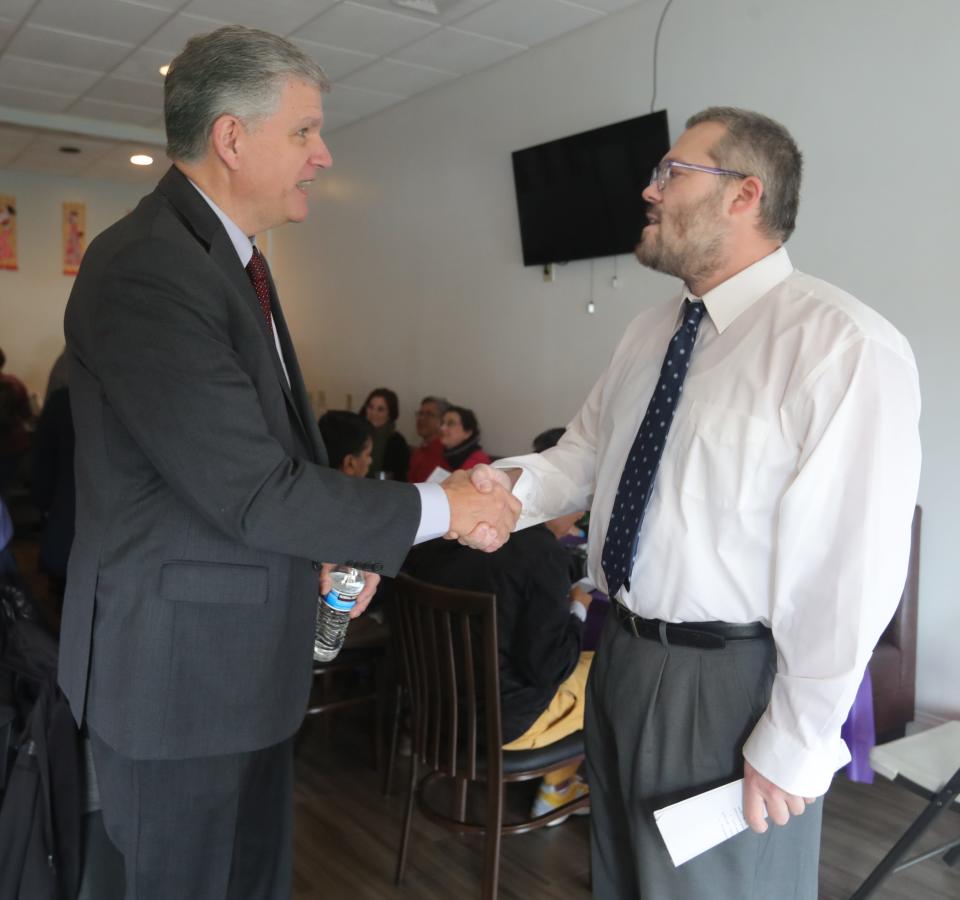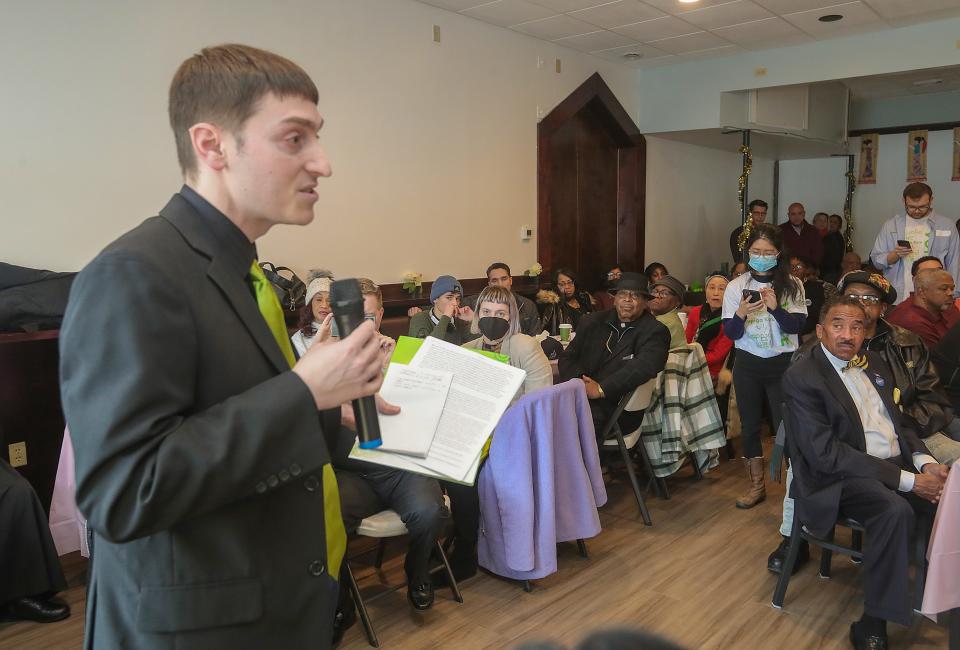Diverse perspectives: Akron mayoral candidates share their vision for Akron at North Hill forum

Akron's mayoral candidates introduced themselves to North Hill residents in the first of a series of forums held by Asian Services in Action (ASIA).
At noon, all six candidates — Shammas Malik, Keith Mills, Tara Mosley, Joshua Schaffer, Marco Sommerville and Jeff Wilhite — gathered on Saturday in Live Mon Thai-Malay Restaurant's dining room to field questions from residents about their vision for the city.
The forum, moderated by ASIA's CEO Elaine Tso, drew inquiries from a full-house crowd on topics ranging from women's reproductive health care to how the future mayor might aid North Hill's immigrant community.
Akron's next mayor:Here are key dates to know for Akron's 2023 mayoral election
Opinion:Akron mayoral candidates need to offer more than just listening to voters | Michael Douglas
"We are here to convene with all of you," Tso said as the forum got underway. "This is not a space for campaigning, I just want to make that clear to the candidates. This is not a campaigning space, we do not endorse any candidates, but we are providing the forum for the information to be available to the community."
Sixty seconds was allotted to each candidate at the beginning of the meeting to introduce themselves and share why they're running and what vision they have for Akron.
The candidates were allowed 50 seconds to speak while fielding questions from the audience, and 40 seconds at the end of the forum for closing remarks.
While not every audience member was able to ask the question they had in mind, event organizers provided sticky notes for residents to write questions, and an easel to which they could affix them. The questions will help ASIA plan its remaining forums and might be used during its next event.
Candidates answered in alphabetical order. Here is a sampling of what they discussed.
How do you define inclusion?

PHOTOS:Akron mayoral candidate forum
Malik, currently the councilman representing Ward 8 where he grew up, said inclusion means making sure everyone engaging with the city government has a positive experience marked by openness and transparency.
"It means that making sure each city department has a plan for engaging with people no matter their language," Malik said.
Inclusion is achieved, said Mills, when all voices in a community are heard. Mills, who lives in Akron, is an intervention specialist at Cleveland's Collinwood High School and a head coach in the district's esports program.
"People need to be able to have a say in their livelihood and a say in what it means to be involved in their community," Mills said. Those in powerful positions listening to their constituents and approaching their problems with a customer service mindset is important as well, he added.
Akron Ward 5 Councilwoman Mosley said that listening to Akron's residents is key, no matter their background.
"You include people by listening to them," Mosley said. "As the mayor of this city, there will be a seat at the table for you all because we have got to do a better job of listening to you."
Schaffer, a cellphone store manager who is billing himself as the most progressive of the candidates, said it is important to have a member of the working class — like himself — representing the rank-and-file's interests.
"I would say inclusion means a variety of different and diverse people," Schaffer said, "and I think that Akron is lacking inclusion in some of our very important areas."
Akron Deputy Mayor Sommerville said inclusion means making sure opportunities are open to everyone. Akron, he said, has a lot of work to do in that regard.
"If you look at our police department, 88% of our police department is white," Sommerville said. "That is not a good look, it's not a good situation to have. And I'm confident that if we get a more diverse police department, they will be more in tune with what's going on in the community and when things come up in the community, people will have more confidence in the police department."
Should he be elected, he said, he'll continue to work on diversifying the city's managerial positions in addition to the police force.
Summit County Councilman Wilhite, a former board member at the Akron-Canton Regional Foodbank and founding executive director of the Summit/Akron Solid Waste Management Authority, said that compassion — a consideration for other people's well-being — is a big part of inclusion.
"It's about compassion, it's about listening, but even more than listening, you've got to act on what you hear," he said. "You can't just sit and listen and not act."
Women's reproductive rights

How, if elected mayor, do the candidates plan to ensure comprehensive reproductive health care for Akronites?
One step that some American communities have taken is ensuring that city employees have access to funds to get the reproductive health care they need — a step that Malik thinks Akron should take.
"And can we extend that to some of our other employers and be a leader on that in the community space?" Malik asked. "But that is a whole broader conversation that's needed about how we support women in our city government through representation, and through empowering people across our whole community to make sure that people have access to jobs and services."
Mills piggybacked off Malik's answer, saying the city should support access to Planned Parenthood — an organization for whom he is a vocal proponent.
"Every citizen, every member of Akron, will have access to reproductive health care," Mills said, "and they'll have full support from the mayor's office to get that access."
Mosley said it's important to make sure reproductive health services are made available to more people than just city employees. Akron residents shouldn't be forced to travel out of state to obtain medical treatment, she said.
"As the only woman in this race," said Mosley, "I first want to say that a woman's right is a human right, and no one, especially a man, should tell a woman what she should be doing with her body."
Schaffer, Sommerville and Wilhite all agreed it's not a man's place to tell women what decisions they're allowed to make concerning their bodies.
Schaffer said he's interested in opening the city health care plan to all Akron residents, creating a universal health care model for the city that will protect a woman's right to reproductive care.
Sommerville voiced his support for Planned Parenthood, saying his daughters deserve the right to make decisions about their own lives.
"My wife and I faced a decision with my son," Wilhite said, "and it was a very scary situation but it was my wife's body. The decision was hers to make, not mine." Legislative bodies have no right to make those kinds of calls for people, he said.
"Rights have to be front and center from women across the board," said Wilhite. It's up to Akron as a community, he added, to stand up to the overturning of the Roe v. Wade decision that ruled abortion was a constitutional right.
Trials of protesters after Jayland Walker shooting

Of concern to one resident was how the slate of prospective candidates would handle the ongoing prosecution of protesters arrested in the aftermath of the police shooting of Jayland Walker.
People are entitled to their First Amendment right to protest, Malik said, but if they engaged in property damage or violence they should be prosecuted.
"But one thing that we do as a city is sometimes we drop cases in exchange for which we ask people to sign a waiver so that they don't sue the city," Malik said. This is a practice he's pushed back against for a number of years. Should he be elected mayor, he said, it's a policy his administration will end.
Mills, Mosley and Schaffer agreed, saying that as long as protests remain peaceful, there's no reason anyone should be arrested or charged.
"You're allowed to come out and express your concern and your disdain for what's going on, there's nothing wrong with that," Mills said. "If our government was more customer service minded, or friendly, or open, had an open conversation with people, these protests won't happen."
Sommerville said that, given his background with the NAACP, he understands the importance of the right to protest.
"I could not stand up here and tell you that I would dismiss all the charges against all the protesters because I don't know what the cases are," he said. "But I will say this: There are three branches of government. Being the mayor, you're not in the judicial end of the deal. The courts have to handle that."
Wilhite seconded Sommerville's comments, adding that he wouldn't infringe on anyone's First Amendment rights.
"I would go to the mat to defend anybody who feels as though they've been mistreated in their right to speech," said Wilhite. "That's how we get things done, that's how we make things better, is when people are heard."
Supporting the community's basic needs

Tso brought up to the candidates that emergency Supplemental Nutrition Assistance Program (SNAP) benefits from the COVID-19 pandemic are set to end in March. With that in mind, she asked, how do they plan to help the North Hill community meet their needs?
Evictions are rising and the lines at food pantries are getting longer, said Malik.
"One of the things that I've pushed a lot, and we're supposed to be implementing this year, is right-to-counsel programs, that everyone facing eviction has a lawyer," Malik said. "These are the types of programs we need now, because we are still facing a crisis around housing and a lot of other issues."
Mills proposed exploring a partnership between the mayor's office and the Akron-Canton Regional Foodbank to keep pandemic benefits alive.
Mosley suggested establishing an emergency fund for city residents to use when times are hard.
"You go into a store and eggs cost $6. We have issues going on in the city that we really have to address, but there needs to be a funding source there for those things to be handled," Mosley said. "Show me your budget and I'll show you the priorities, and our priorities have to be the residents in this community — especially right now when they're struggling."
Schaffer's fix involves working with the Akron-Canton Regional Foodbank, creating grants for food education and for provisions. He also advocates growing food in abandoned lots instead of developing them.
"I'm talking about reforestation, about acquiring new lands, about planting apple trees and all kinds of fruits and vegetables, having chickens and things like that where people can get free food — free healthy food — and we can protect our environment at the same time," Schaffer said.
The Summit County Health Department, Sommerville said, has a division that handles issues like this. It's not the purview of the mayor's office.
However, he said, the city did receive a considerable amount of pandemic funds from the federal government that could be redirected to address Akron's shifting needs.
"I would agree that the crisis is looming and it's going to surprise all of us, I think, in more ways than one," Wilhite said. The answer doesn't necessarily lie with government action. The people, he said, can band together to alleviate the problem.
"This city has a long history of pulling together when folks in our community need us," said Wilhite.
The constituency responds to mayoral candidates
After the forum ended, the candidates circulated in the crowd as audience members talked among themselves.
Traci Person raised the question of reproductive health care during the meeting. She works with Planned Parenthood as a senior regional field manager of black organizing.
Person said that although all six candidates declared themselves to be in support of abortion rights, she was looking for more specifics from some of them about how exactly they plan to back access to reproductive health care.
She doesn't know who she's going to vote for.
"However, what I am hearing I am going to be able to share with those who support Planned Parenthood so they can make the right decision and make sure that we get the right people in the right positions," said Person.
Laura Lederer said the forum was an eye-opening display of different perspectives.
"I walked in here thinking I knew exactly who I wanted to vote for, and now I'm not so sure," she said. Lederer didn't want to reveal who she'd planned on voting for, but she did say she heard many good ideas over the course of the meeting, and came away impressed by the diversity of the crowd and of the candidates, as well as the meeting itself. She hopes to attend the next forums in the series.
"I'm impressed by the fact that we're having these kinds of open dialogues," Lederer said.
Contact reporter Derek Kreider at DKreider@Gannett.com
This article originally appeared on Akron Beacon Journal: Akron mayoral candidates field questions from community

